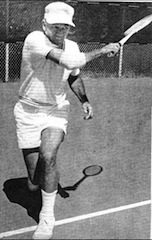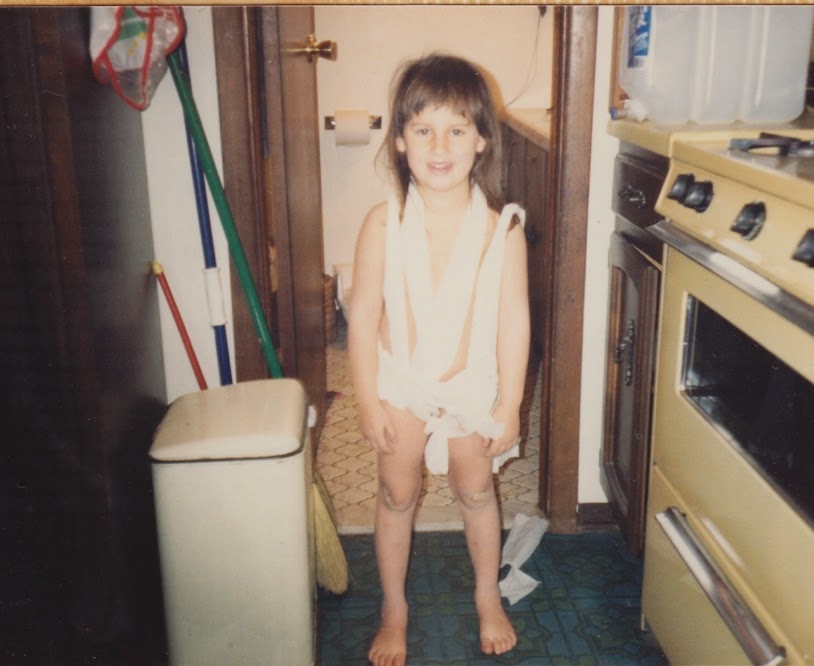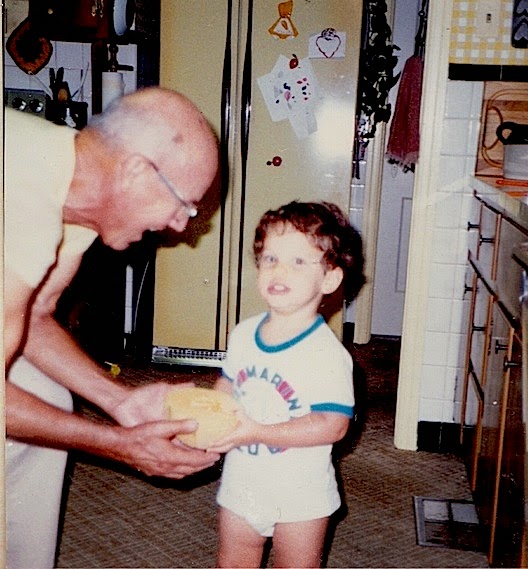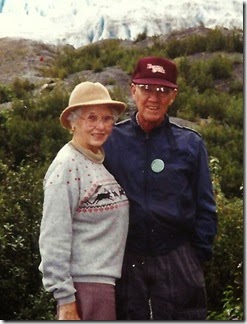
Herbert Roy Needham (April 18, 1915–February 20, 1990)
Editor’s Note: If you’re fortunate enough to be friends with Sandra Needham Abdalla, you’re also fortunate enough to be a regular recipient of her Dispatches—digital newsletters chronicling the many discoveries and adventures she and Newton Abdalla (her brilliant, true gentleman of a husband) and occasionally her children Jake and Elise experience in traveling to some of the world’s greatest cities and to some of the planet’s more exotic spots. These chronicles are literate, witty, loving and insightful, the work of a polished, sensitive writer. Those of us who have known her since she was Sandra Needham, Tulsa Central High School’s Queen of the Class of 1967, are hardly surprised at her eloquence on the page—there was always something special about her, a certain light that burns ever brighter as the years pass. Turns out this all started where it should, in her home, thanks to a mother and father who themselves could be described as literate, witty, loving and insightful. Sometimes Sandra turns her attention to more personal matters, as when, a few years ago, her mother passed away and became the subject of one of Sandra’s most moving Dispatches. That piece should have run in Deep Roots, so great was its potential to touch others’ lives and perhaps help them through a tough time of losing a loved one. This year marks the centennial of her late, remarkable father’s birth (April 18, 1915), so Sandra recently devoted one of her Dispatches to paying tribute to Herbert Roy Needham. We’re not letting this one slip through our digital fingers. With Sandra’s permission we share this with our readers in hopes you will be as touched by it as we were. –David McGee
Saturday, April 18, 2015
“My father was very intelligent and, like all intelligent men, very kind.” So wrote Jorges Luis Borges in his famous short story, ‘The Aleph.”
The moment I read those words years ago, I immediately knew they applied to my father, Herbert Roy Needham; April 18, 1915–February 20, 1990. Herb, Herby, Herbert, Daddy. He was so extraordinary that I must confess, over my lifetime Abraham Lincoln, Arthur Ashe, and the Dalai Lama have reminded me of him; humor, curiosity, profundity, honesty, humility, grace, compassion.
My mother told the story of knowing him in high school, Capital Hill High School in Oklahoma City, but not being interested in him at all until later at Oklahoma State University. She had considered him “kind of a farm boy.” This is funny because my mother was, in fact, a farm girl! But she was the socially outgoing, confident valedictorian who clearly fancied herself otherwise. They were the best couple I will ever know.

Navy Payroll Officer, U.S.S. Cleveland Light Cruiser, Pacific 1944
So there always was a simplicity about Herby–not a simple-mindedness–but such a lack of pretension, such a lack of hubris of any sort. It was an elegance that a farm boy who embraced the cosmos could embody. His sense of humor inclined towards puns (“the lowest form of humor,” he proudly affirmed), corny twists (those stories that ended with lines like “Opporknockity tunes but once” or “Pardon me, Roy, is that the cat who chewed your new shoes?”), and out-laughing everyone else at the table over his own jokes. He walked in the door at 5:30 every weeknight and we all sat down to dinner soon after. This occasion included Daddy’s cracking up at his jokes as well as a discussion on the various types of love: agape, eros, philia, among other curiosities of history, psychic phenomena, ideas. When company was present, he loved to joke about the butter knives being laid out, which resulted in a traditional family favorite, “The Herby Look,” administered by Mother with futile subtlety. Dinner was always fun and interesting.

Awaiting Herby’s Return, 1944
I was the fourth daughter, so I have more personal memories of him during my high school years when the older sisters were at college or already married. He liked to shoot a basketball into the hoop he had attached to a tree in the corner of our backyard. His arcane proclivities enabled him to envision the ball arching towards the center of that hoop and swishing through it. He taught me how to try this. I saw him swish twelve in a row once. I developed my visualization “muscle” over the years, thanks to him.

50th Wedding Anniversary, 1987
After I went away to college, he undertook intense self-training for tennis. He followed the Air Force fitness standards, running the nine floors of stairs at his Southwestern Bell Telephone Company office during lunch hour. He read The Zen of Tennis, which prescribed concentration not on the ball but on the seam of the ball. He poured a concrete slab on our back lawn up to the neighbors’ garage wall, where he painted a solid line (“the net”) and a dotted line above it (“do not hit above this line”). The neighbors were all close friends in that magical time. I can remember waking to the rhythm of his serve and volley practice on that slab outside my window when I came home between college quarters. Herb became a serious competitor at age 55; at 59 he was Number 2 in Oklahoma’s ‘Age 55 and Over’ bracket.
Then he noticed a shortness of breath and endurance problems and discovered that he had a heart condition. This was based on a heart muscle weakened many decades prior when he had a childhood virus. He was supposed to just sit still for a year.
Herbert’s mystical side was rich with study, experimentation and the focused discipline he believed was a great source of freedom (“if you have the discipline, then you are free to accomplish what you wish”). Studying texts by Max Freedom Long, Herb followed an ancient technique from Polynesian kahunas (and from plenty of other ancient traditions) where the balanced physical, emotional and mental meet in a present moment and connect to an illusive higher energy (…the soul? …the higher self? …an electromagnetic connection to the universe’s force field? …the source of creation?). While practicing this presence, Daddy expressed gratitude for the tennis, which had been such an exquisite gift. The moment was an epiphany of sorts that resulted in a normalization of his heart function. The doctor never knew why, but Herby was back on the tennis courts after seven months. He did limit his tournament play from then on to doubles, eventually becoming Number 1 in Oklahoma’s “Age 55 and Over” bracket!

Somehow I doubt those were really his clothes! Oklahoma City, 1919
He liked to write; sometimes poems. During this time, knowing that his heart health could be compromised, he stated that he would like to die some years hence while going for a great shot on the tennis court:

A little rascal at the farm house, 1921

Chances
Taking chances with the heart
Is not a sport;
You really might die out
On the court.
But if you stayed in bed instead
And you died,
You’d be just as dead.
The methodical approach Herbert followed led him to read every book on a published list of English literature classics, starting at the top and working his way down. Both Mother and Daddy attended American Institute of Discussion sessions, where more contemporary and international literature was explored. He also enrolled in a semester of Art History at Tulsa University, so we had much to discuss from my literature and Art History studies at college. Later, ten years after his death when Mother moved from the house to a retirement community, I found all sorts of books on Daddy’s shelves that paralleled interests of mine, including the rich esoteric selection and a well-underlined paperback by Erik Erikson about child development and progressive education (which was turning into my second career at that point!).
Favorite lessons from this great seeker of wisdom were insightfully shared with us. Viktor Frankl’s Man’s Search for Meaning was a life-long favorite of Daddy’s. Its theme: that the only freedom that cannot be taken from a person is the choice of how to respond to what life serves up, which in Frankl’s case was a Nazi concentration camp.
I have confirmed the truth of another of Daddy’s lessons: the opposite of love is not hate, but fear. It sounds tougher to go around hating “The Other” than to admit fear of “The Other”; or fear of our unknown selves; or fear of mystery. And love–in one form or another–is the antidote. Hate is just a hairline away from love, and the two are so frequently intertwined…due to fear.
On religion and science? Daddy’s liberal Protestantism, which he eventually gave up, never required an argument with the vastness of creation. He, as I, believed conventional science has barely scratched the surface of our minds and our cosmos, so he saw science as the incremental revealer and consciousness as the immediate revealer. As his spiritual pursuits headed evermore away from doctrine in the direction of seeking a “great oneness” from moment to moment–“prayer without ceasing”–he preserved a Christian framework and idiom for this practice, seeking Christ’s example of wakefulness itself in lieu of organized religion.
A Minute
I am a minute man
I want to live each one
As fully as I can.
Life
Life is bigger
Than most
People figger.
Thank You
Thank you God
For all the
Blessings of Life;
The ones we recognize
And
The ones in disguise.
Anyone who attempts mindful practice knows how resistant we humans are to intense, fleeting consciousness. Here’s my favorite poem of Daddy’s:
Snow
The snowflakes fall lazily to the ground
Dancing in the floodlights –
Giving themselves unresistingly
To the air and to the purpose
Of their existence.
The wonder and beauty of it –
I am touched – inspired
And sent to thinking about
Snow and life.
How I wish I might be as
Unresisting to my life purpose
As the snow flakes that dance
Their lives away in the light of evening.
I love the intimation in this line from his poem “On the Mountain,” which describes the astonishing beauty of sunrise breaking through fog in a forest. It proposes the ultimate connection between the personal and the phenomenal:
Oh Lord! How could you paint such beauty for me?
I am often moved to quote it when the beauty of nature, ocean and sky, stuns me.
I often quote another favorite of mine, substituting various creatures who regularly appear inside my house in Brazil:
Little Mouse
Bless you little mouse
You are my brother,
But not in the house!
One compelling image of my father was from a trip back home I took as a young adult. He was still a member of the Methodist Church then, and I visited my parents’ Sunday School class that day. These were older folks, and the body language of some of the men fulfilling their “pillars of the community” status was over-the-top during the group prayer. While the histrionics were entertaining, there was pomposity there. I looked over at Daddy, who went inside the moment instead. The strength of his embodiment of unassuming humility and presence was so defining about him.
And the kindness. He could really see the person in front of him at times. He observed that our daughter Elise was in “control of her world” when she was only seven months old, and how true that observation has proven! He observed the long attention span and acute concentration of our son Jake when he was just a year old. Bingo!


I was very moved at his funeral hearing from the parade of people whose lives he affected:
As the Personnel Manager at the regional telephone company in Tulsa, he turned a corporate setting into a very human one. He found the personal connections so satisfying that he turned down all further promotions on the corporate ladder and stayed in that job for 17 years, until retirement. How many came through the funeral receiving line to say he had hired them in 1957, 1963, 1970, etc. and had remained their friend all those years?
After retirement Herby became a volunteer Hospice counselor. The dying and their families had an attentive, open listener. One of the most emotional encounters I had at the funeral was with the man dying of AIDS to whom Daddy had been assigned. He was a drug user and his wife was also dying of AIDS. They had two teenage sons. He said Herb was the only person in his life who had ever cared about him. From that time on till the husband and wife both died–“here I hang on with a sob”*–my equally compassionate Mother unofficially stepped in and continued loving support for the couple.
(* from Daddy’s poem, ‘The Letter”)
Herby did fulfill his wish to drive to Alaska with Mother some months before prostate surgery and ensuing heart problems took away tennis and the quality of his life. It is amazing to look on a globe and see the gigantic swath of earth that spans from Oklahoma to Alaska. They had visited nearly all the states by car, alternating the driving every hour with a little march around the car to stretch legs, but this two-month trip was the crowning glory.

Herbert pushed hard for risky heart surgery, as he was not interested in a prolonged, enfeebled life. Sure enough, there was no long life to be had.
I fall short of all of his qualities, but I find more and more how I am inspired by him: seeking, questioning, striving, wishing; trying to calm myself and be still, as he could do. I have had good fortune nearly all my life, but having this father of mine (and that mother of mine) are at the top of the list.
Happy centennial of your birth, Daddy, and thanks for showing me what a human can be.
Love,
Sandra

With a line from a poem Herby wrote to Laurene

